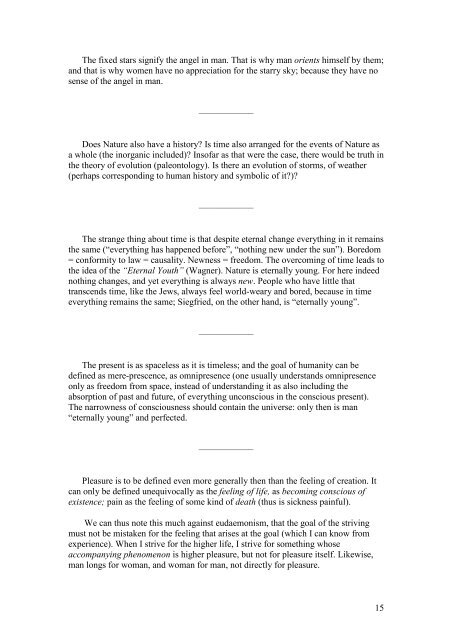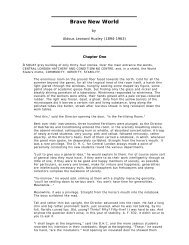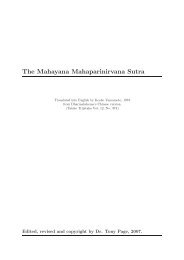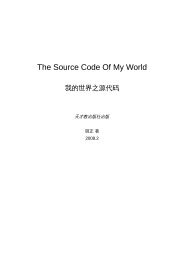Aphoristic Writings, Notebook, and Letters to a Friend, by Otto ...
Aphoristic Writings, Notebook, and Letters to a Friend, by Otto ...
Aphoristic Writings, Notebook, and Letters to a Friend, by Otto ...
Create successful ePaper yourself
Turn your PDF publications into a flip-book with our unique Google optimized e-Paper software.
The fixed stars signify the angel in man. That is why man orients himself <strong>by</strong> them;<br />
<strong>and</strong> that is why women have no appreciation for the starry sky; because they have no<br />
sense of the angel in man.<br />
––––––––––––<br />
Does Nature also have a his<strong>to</strong>ry? Is time also arranged for the events of Nature as<br />
a whole (the inorganic included)? Insofar as that were the case, there would be truth in<br />
the theory of evolution (paleon<strong>to</strong>logy). Is there an evolution of s<strong>to</strong>rms, of weather<br />
(perhaps corresponding <strong>to</strong> human his<strong>to</strong>ry <strong>and</strong> symbolic of it?)?<br />
––––––––––––<br />
The strange thing about time is that despite eternal change everything in it remains<br />
the same (“everything has happened before”, “nothing new under the sun”). Boredom<br />
= conformity <strong>to</strong> law = causality. Newness = freedom. The overcoming of time leads <strong>to</strong><br />
the idea of the “Eternal Youth” (Wagner). Nature is eternally young. For here indeed<br />
nothing changes, <strong>and</strong> yet everything is always new. People who have little that<br />
transcends time, like the Jews, always feel world-weary <strong>and</strong> bored, because in time<br />
everything remains the same; Siegfried, on the other h<strong>and</strong>, is “eternally young”.<br />
––––––––––––<br />
The present is as spaceless as it is timeless; <strong>and</strong> the goal of humanity can be<br />
defined as mere-prescence, as omnipresence (one usually underst<strong>and</strong>s omnipresence<br />
only as freedom from space, instead of underst<strong>and</strong>ing it as also including the<br />
absorption of past <strong>and</strong> future, of everything unconscious in the conscious present).<br />
The narrowness of consciousness should contain the universe: only then is man<br />
“eternally young” <strong>and</strong> perfected.<br />
––––––––––––<br />
Pleasure is <strong>to</strong> be defined even more generally then than the feeling of creation. It<br />
can only be defined unequivocally as the feeling of life, as becoming conscious of<br />
existence; pain as the feeling of some kind of death (thus is sickness painful).<br />
We can thus note this much against eudaemonism, that the goal of the striving<br />
must not be mistaken for the feeling that arises at the goal (which I can know from<br />
experience). When I strive for the higher life, I strive for something whose<br />
accompanying phenomenon is higher pleasure, but not for pleasure itself. Likewise,<br />
man longs for woman, <strong>and</strong> woman for man, not directly for pleasure.<br />
15







